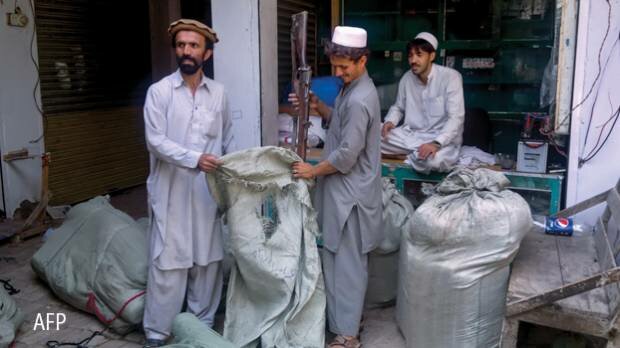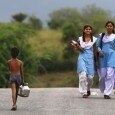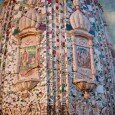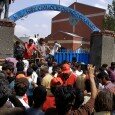By Mirza Khurram Shahzad –
Surrounded by undulating lush green hillocks, natural streams and a blue lake at the edge of Islamabad, the hamlet of Bhara Kahu – a designated first stop to the summer resort of Murree – has always been an attractive, cheap and environment friendly
neighborhood to live in.
Not more than fifteen minutes’ drive from the Presidency and the highly secure diplomatic enclave, the village had been a paradise for mid-grade government officials and private sector employees who can’t pay hefty rents in the elite residential sectors of the capital.
The beautiful valleys around Bhara Kahu have also attracted the wealthy and affluent to build farm-houses for relaxing evenings away from the hustle and bustle in the metropolitan. But all this was before the Waziris took over.
Until November 11, 2013, few had known that this quiet village was becoming a settlement for scores of families from the war hit northwestern tribal belt, and that some of the world’s most feared militants were also quietly nestled there in disguise.
The killing of Nasiruddin Haqqani, the financier of the Haqqani network and one of the sons of its founder Jalaluddin Haqqani, known as Doctor Nasir among the locals of Shahpur colony of Bhara Kahu, shocked and astonished many in the federal capital. Now, every next shop and business centre in the Bhara Kahu bazaar is owned by a person with tribal background. The tyre shop owners, the fruit vendors, the bakers and the grocery traders, all belong to the restive tribal area.
Nasiruddin Haqqani’s quite street
Life in the street is quite where Nasiruddin Haqqani lived before being gunned down. The house, from where he used to run the militant fund raising network – mainly through kidnapping for ransom, protection money from traders, businessmen and industrialists, car lifting, drug dealing and arms smuggling – has been rented out to another tenant now, but from a different background, Multan.
Police has strictly forbidden the locals to rent houses to people from Waziristan and each property dealer is told to inform the cops about the identity of tenant and house owner for every new agreement. But it is quite evident that they have dug in much deeper even before the local police started taking these measures.
The people from the tribal areas, especially from Waziristan, the Kurram Agency and even those from Swat and Bajaur continue to pour in and with the renewed military operation another influx of the Internally Displaced Persons (IDPs) is expected to arrive.
“The families from Waziristan who were linked to Nasiruddin Haqqani, abandoned this street the same night when he was killed. No other family from Waziristan has taken up abode in this particular street since then but many have come to live in adjacent streets,” says Arif Hussain, a general store owner, who himself escaped militancy in Para Chinar, the headquarters of Kurram Agency.
A hideout away from military operations
Just opposite the Shahpur Colony, on Prince Road, a wide paved avenue snaking to the top of a hill, Mansoor Ali Mehsud has set up Ariana Mini Cash & Carry. Mehsud fled a military operation in Makeen, South Waziristan in 2007 and has now settled with his family here.
“Bhara Kahu is swarmed by the people of South and North Waziristan. We all have come here avoiding series of military operations and power-wars among the militant outfits in Waziristan,” he says.
“This area suits us. It’s close to Murree and receives cool breeze, so we don’t feel much change in weather compared to Waziristan. There are excellent living facilities here and it is more of a rural settlement away from the city’s security and checking issues,” he said.
“More than 500 families from Waziristan have settled here. Dozens of families from North Waziristan have arrived in the last one month after fresh military operations commenced. They are buying properties here. A rich elder from the North Waziristan finalized a deal to buy a house for 12 million rupees just yesterday,” said Mehsud.
As he finished talking, a couple of luxury Toyota Corolla cars zoomed past the road skirting his shop and Mehsud joyously waived. ‘They have just arrived from North Waziristan’.
The fresh arrivals
Yards ahead, a middle-aged man accompanied by a couple of young men with the traditional tribal-style haircut sit idle in the street.
“We came here a month ago after walking all the way from our village up to Bannu for two days,” said Umarzada Dawar, an inhabitant of Hamzooni, a village on the outskirts of Miranshah, the main town of North Waziristan. “The conditions are worst in Miranshah and severe fighting is going on between the military and the militants,” Dawar, a solar panels dealer in Miranshah, who migrated with seven of his children and 50 other relatives, said.
According to Dawar, at least fifty other families have shifted to Bhara Kahu during the last two weeks from North Waziristan.
“One of my relatives, who had been living here since years, advised me to come here. I own a house in Tarnol area in the west of Islamabad but I preferred to shift here because many of our relatives are living here now,” he said.
Long term settlement
Dawar evidently has no plans to end his IDP status and return to his home in North Waziristan. He has planned to settle down in Bhara Kahu. “I also own two shops on main Murree road in Bhara Kahu bazaar. I am contemplating whether to set-up my solar panel business in those shops or somewhere in Islamabad city,” he said.
For property dealer Haji Nasir, who was a close friend of Nasiruddin Haqqani and claimed to be unaware of his underground network, only the rich people of Waziristan come to this area.
“The rent as well as the prices of the properties here had soared exorbitantly. So, only those people from Waziristan come here who are rich and can afford paying heavy rent or buying properties here,” he said.
Haroon Rasheed, who works as a capacity building consultant in the area says that the locals call this area ‘Mini Waziristan’ as the number of people with links to Waziristan and other tribal areas has surprisingly increased during the previous years.
“Now it is no more the ‘Rajas’ or the ‘Abbasis’, the natives of the area, dominating Bhara Kahu, most commercial plazas and the best of the residential properties and compounds are now owned by Waziris, Mehsuds and Dawars from North and South Waziristan,” explained Rasheed.
Police estimates and efforts
Following the killing of Nasiruddin Haqqani in Bhara Kahu, police conducted a survey in the area to determine the number of outsiders living there.
“The number of people belonging to Waziristan is a little over 50,000 among the total population of 225,000 in Bhara Kahu,” said a local police official on the condition of anonymity because he is not authorised to reveal the details of the survey.
Police in the area have provided registered mobile phone SIMs to property dealers in the area and asked them to become informants.
But despite these steps, the links of at least three terrorist acts have been traced to this particular locality during the last year.
An attempted suicide attack on a mosque in Bhara Kahu on the last Eid-ul-Fitr was one of the major actions taken by militants using hiding in the area. Following which the law enforcement agencies arrested key suspects in the murders of former federal minister Shahbaz Bhatti and prosecutor of the Benazir Bhutto murder case, Chaudhry Zulfiqar from the area.
Capital slums
According to an assessment by the federal ministry of States and Frontier Regions (SAFRON), seven percent of the total million IDPs from the recent military offensive in North Waziristan have fled to Islamabad, its adjoining areas and Karachi.
The authorities believe that most of the IDPs have been shifted to their relatives already living in Bhara Kahu and other residential areas of the capital and its adjacent Rawalpindi city. But chances are that several others have settled in the slums spread all over Islamabad, particularly the Afghan settlements in sector I-11.
The security forces consider the arrival of a large tribal population in the capital to be a great security concern.
“Now, when a large number of population from Waziristan has arrived in Bhara Kahu and other areas of the capital, it’s feared that some militants might have also shifted in the capital in the disguise of IDPs. It’s a big risk and they can strike anytime anywhere, we need to be careful about that,” said a senior official of the security division of the capital police.
The writer is a journalist based in Islamabad.






























































































